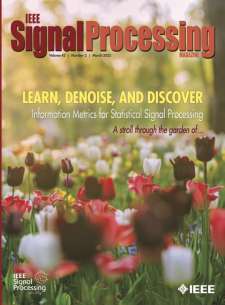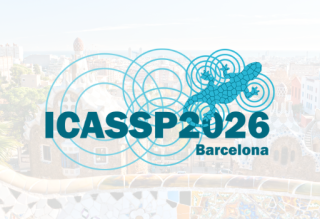- Our Story
- Publications & Resources
- Publications & Resources
- Publications
- IEEE Signal Processing Magazine
- IEEE Journal of Selected Topics in Signal Processing
- IEEE Signal Processing Letters
- IEEE Transactions on Computational Imaging
- IEEE Transactions on Image Processing
- IEEE Transactions on Information Forensics and Security
- IEEE Transactions on Multimedia
- IEEE Transactions on Signal and Information Processing over Networks
- IEEE Transactions on Signal Processing
- IEEE TCI
- IEEE TSIPN
- Data & Challenges
- Submit Manuscript
- Guidelines
- Information for Authors
- Special Issue Deadlines
- Overview Articles
- Top Accessed Articles
- SPS Newsletter
- SigPort
- SPS Resource Center
- Publications FAQ
- Blog
- News
- Dataset Papers
- Conferences & Events
- Community & Involvement
- Professional Development
- For Volunteers
- Information for Authors-OJSP
-
Home
Conferences Events IEEE Signal Processing Magazine IEEE SPL Article IEEE TIFS Article IEEE TMM Article IEEE TSP Article Jobs in Signal Processing Lectures Machine Learning Seasonal Schools Signal Processing News SPM Article SPS Distinguished Lectures SPS Newsletter Article SPS Webinar SPS Webinars SPS Webinar Series Webinar webinars
-
Our Story
What is Signal Processing?

The technology we use, and even rely on, in our everyday lives –computers, radios, video, cell phones – is enabled by signal processing. Learn More » -
Publications & Resources
-
SPS Resources
- Signal Processing Magazine The premier publication of the society.
- SPS Newsletter Monthly updates in Signal Processing
- SPS Resource Center Online library of tutorials, lectures, and presentations.
- SigPort Online repository for reports, papers, and more.
- SPS Feed The latest news, events, and more from the world of Signal Processing.
-
SPS Resources
-
Conferences & Events
-
Community & Involvement
-
Membership
- Join SPS The IEEE Signal Processing Magazine, Conference, Discounts, Awards, Collaborations, and more!
- Chapter Locator Find your local chapter and connect with fellow industry professionals, academics and students
- Women in Signal Processing Networking and engagement opportunities for women across signal processing disciplines
- Students Scholarships, conference discounts, travel grants, SP Cup, VIP Cup, 5-MICC
- Young Professionals Career development opportunities, networking
- Get Involved
-
Technical Committees
- Applied Signal Processing Systems
- Audio and Acoustic Signal Processing
- Bio Imaging and Signal Processing
- Computational Imaging
- Image Video and Multidimensional Signal Processing
- Information Forensics and Security
- Machine Learning for Signal Processing
- Multimedia Signal Processing
- Sensor Array and Multichannel
- Signal Processing for Communication and Networking
- Signal Processing Theory and Methods
- Speech and Language Processing
- Technical Working Groups
- More TC Resources
-
Membership
-
Professional Development
-
Professional Development
- Signal Processing Mentorship Academy (SigMA) Program
- Micro Mentoring Experience Program (MiME)
- Distinguished Lecturer Program
- Distinguished Lecturers
- Distinguished Lecturer Nominations
- Past Lecturers
- Distinguished Industry Speaker Program
- Distinguished Industry Speakers
- Distinguished Industry Speaker Nominations
- Industry Resources
- IEEE Training Materials
- Jobs in Signal Processing: IEEE Job Site
-
Career Resources
- SPS Education Program Educational content in signal processing and related fields.
- Distinguished Lecturer Program Chapters have access to educators and authors in the fields of Signal Processing
- Job Opportunities Signal Processing and Technical Committee specific job opportunities
- Job Submission Form Employers may submit opportunities in the area of Signal Processing.
-
Professional Development
-
For Volunteers
-
For Board & Committee Members
- Board Agenda/Minutes* Agendas, minutes and supporting documentation for Board and Committee Members
- SPS Directory* Directory of volunteers, society and division directory for Board and Committee Members.
- Membership Development Reports* Insight into the Society’s month-over-month and year-over-year growths and declines for Board and Committee Members
-
For Board & Committee Members
Popular Pages
Today's:
- Information for Authors
- SA-TWG Webinar: New Frontiers in One-Bit Signal Processing: From Sample Abundance to Efficient Intelligence at Scale
- Annual Call for Proposals
- Submit Your 2026 ICASSP Workshop Paper
- New Podcast Episode: Trustworthy Machine Learning & Artificial Intelligence
- IEEE Transactions on Information Forensics and Security
- IEEE JSTSP Special Issue on Advanced AI and Signal Processing for Low-Altitude Wireless Networks
- (ICME 2026) 2026 IEEE International Conference on Multimedia and Expo
- SPS Scholarship Program
- (ASRU 2025) 2025 IEEE Automatic Speech Recognition and Understanding Workshop
- Signal Processing 101
- IEEE Transactions on Signal Processing
- Conference Call for Papers
- Information for Authors-SPL
- IEEE Signal Processing Letters
All time:
- Information for Authors
- Submit a Manuscript
- IEEE Transactions on Image Processing
- IEEE Transactions on Information Forensics and Security
- IEEE Transactions on Multimedia
- IEEE Transactions on Audio, Speech and Language Processing
- IEEE Signal Processing Letters
- IEEE Transactions on Signal Processing
- Conferences & Events
- IEEE Journal of Selected Topics in Signal Processing
- Information for Authors-SPL
- Conference Call for Papers
- Signal Processing 101
- IEEE Signal Processing Magazine
- Guidelines
Last viewed:
- IEEE Signal Processing Society Annual Election Opens on 17 October
- Signal Processing Mentorship Academy (SigMA) Program
- Information for Authors
- Member Nomination
- IEEE Transactions on Information Forensics and Security
- Türkiye Chapter
- Membership Board
- 2025 Picture Coding Symposium (PCS)
- Access Restricted
- Dataset Resources
- SigPort
- Multicarrier ISAC: Advances in waveform design, signal processing, and learning under nonidealities
- Inside Signal Processing Newsletter
- SPS Resource Center
- An Iterative Image Dehazing Method With Polarization
Publications & Resources
Signal Processing Magazine
For Authors
Top Reasons to Join SPS Today!
1. IEEE Signal Processing Magazine
2. Signal Processing Digital Library*
3. Inside Signal Processing Newsletter
4. SPS Resource Center
5. Career advancement & recognition
6. Discounts on conferences and publications
7. Professional networking
8. Communities for students, young professionals, and women
9. Volunteer opportunities
10. Coming soon! PDH/CEU credits
Click here to learn more.
Science is Blind
I started drafting this editorial on July 4th while sitting in my hotel room in Versailles, France. Both the date and location have great significance in our modern history, which motivated my choice for the theme of the article.
The date of July 4th coincides with the commemoration of Independence Day in the United States. It refers to the day back in 1776 when the Declaration of Independence, drafted by Thomas Jefferson and his colleagues, was adopted. The location, next to the Palace of Versailles, which housed the Kings of France until the outbreak of the French Revolution in 1789, reminded me of a second historical document approved that year by the French Constituent Assembly and known as the Declaration of the Rights of Man and of the Citizen. This document was also drafted with input from Thomas Jefferson. Both documents ascertained the rights of men and served as drivers for civil liberties, although with some challenges along the way.
Today, we experience a continuous stream of news, stereotypes, and opinions about immigrants and foreigners, including veiled arguments hinting at the superiority of one race or ethnicity over another. As scientists, we value diversity in all its forms and know that science and education should help reduce inequities due to racial, ethnic, gender, religious, or economic biases.
I am the son of immigrants. My parents immigrated in the 1950s to the faraway, beautiful, and generous land of Brazil where I was born. Later in life, I followed in their footsteps and immigrated to the United States, the most creative and inventive land on Earth, a land of opportunities, one that was described as the “shining city on the hill” welcoming hard-working people from all corners of Earth with its majestic Statue of Liberty. The statue itself was a gift from the people of France to the American people in 1886; a second historical link between the two countries besides the declarations mentioned previously. One of the main reasons for the prominence of the United States on the World stage today is that it embra - ced diversity, pushed for equality, and opened its doors to the best and brightest who helped propel a wave of innovation and economic growth.
SPS Social Media
- IEEE SPS Facebook Page https://www.facebook.com/ieeeSPS
- IEEE SPS X Page https://x.com/IEEEsps
- IEEE SPS Instagram Page https://www.instagram.com/ieeesps/?hl=en
- IEEE SPS LinkedIn Page https://www.linkedin.com/company/ieeesps/
- IEEE SPS YouTube Channel https://www.youtube.com/ieeeSPS
Home | Sitemap | Contact | Accessibility | Nondiscrimination Policy | IEEE Ethics Reporting | IEEE Privacy Policy | Terms | Feedback
© Copyright 2025 IEEE - All rights reserved. Use of this website signifies your agreement to the IEEE Terms and Conditions.
A public charity, IEEE is the world's largest technical professional organization dedicated to advancing technology for the benefit of humanity.











